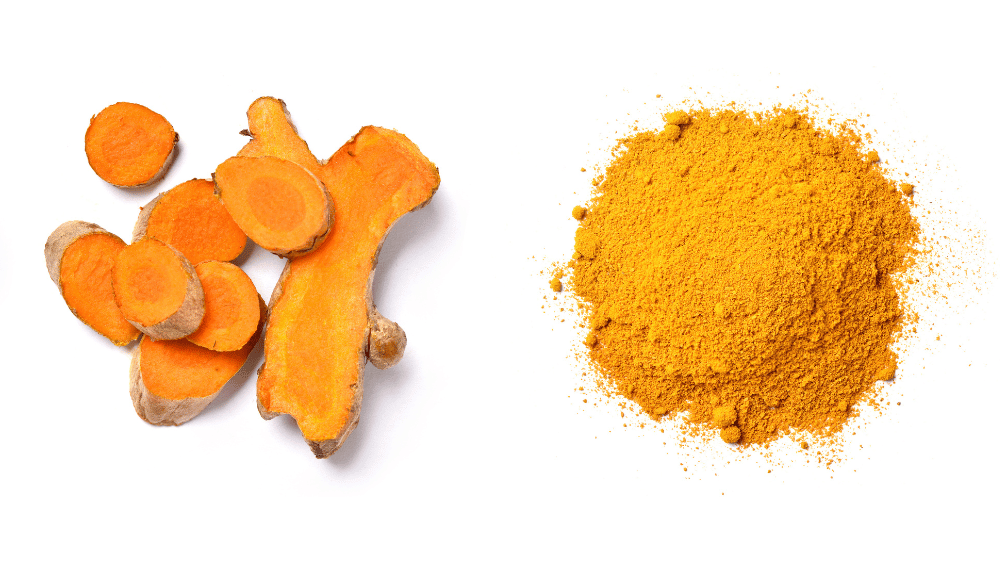From ancient Ayurvedic remedies to modern wellness supplements, both have gained popularity for their anti-inflammatory and antioxidant properties. The biggest difference between turmeric and curcumin comes down to composition and potency.
Curcumin & Turmeric: What’s The Difference & Which Should You Choose?


Understanding Turmeric & Curcumin
Turmeric and curcumin are sometimes thought of interchangeably, but they’re not quite the same thing. While turmeric has been a staple in kitchens and traditional medicine for centuries, curcumin is the active compound within it that’s responsible for many of its health benefits.
From ancient Ayurvedic remedies to modern wellness supplements, both have gained popularity for their anti-inflammatory and antioxidant properties.
But what sets them apart, and which one is best for your needs? Let’s break it down.
What Is Turmeric?
Turmeric is a bright golden-yellow spice derived from the root of the Curcuma longa plant, a member of the ginger family. It has long been used in Indian and Southeast Asian cuisine, giving dishes like curry their distinctive colour and earthy flavour.
Beyond the kitchen, turmeric has been valued for centuries in traditional medicine for its potential health-supporting properties. Today, turmeric is widely available in various forms, from ground spice to teas and supplements.
What Is Curcumin?
Curcumin is the most well-known active compound found in turmeric, and it’s what gives turmeric its impressive health benefits.
However, curcumin is only present in small amounts within turmeric – typically around 2-5% of its total composition. Because of this, curcumin is often extracted and concentrated into supplement form, making it easier to achieve higher doses for targeted health support.
Key Differences Between Turmeric & Curcumin
The biggest difference between turmeric and curcumin comes down to composition and potency. Turmeric is a whole-root spice that contains curcumin along with other beneficial compounds, making it useful for general wellness and culinary purposes.
Curcumin, on the other hand, is a major component of curcuminoids single active ingredient extracted from turmeric and concentrated for maximum effectiveness. Curcuminoids, including curcumin, are often standardised to 95% in supplements for optimal concentration.
While turmeric can be a great addition to a healthy diet, curcumin supplements are often preferred for those looking for more targeted support.
Health Benefits of Curcumin & Turmeric
Anti-Inflammatory Benefits
Chronic inflammation is linked to various health concerns, from joint discomfort to digestive issues, and both turmeric and curcumin have been studied for their natural anti-inflammatory properties.
Because curcumin is found in such small amounts in turmeric, concentrated curcumin supplements are often preferred for those seeking stronger anti-inflammatory support.
Antioxidant Properties
Both turmeric and curcumin are rich in antioxidants, which help fight oxidative stress caused by free radicals – unstable molecules that can damage cells and contribute to ageing and various health concerns.
Antioxidants play an important role in maintaining overall health, supporting immune function, and protecting against environmental stressors. While turmeric as a whole contains a range of antioxidant compounds, curcumin is particularly powerful due to its ability to neutralise free radicals.
Digestive & Joint Health
Turmeric has been used for centuries to support digestion, with its natural compounds believed to help soothe the gut and promote healthy digestion. It has traditionally been used to relieve bloating and discomfort, making it a staple in many herbal remedies.
Can You Take Turmeric & Curcumin Together?
Yes! Turmeric and curcumin can work together to provide a well-rounded approach to wellness. Turmeric, with its mix of beneficial compounds, offers a more holistic effect, while concentrated curcumin delivers higher potency for targeted benefits.
Combining the two may be particularly useful for those looking to support overall health while also addressing specific concerns like joint discomfort or inflammation.
For example, adding turmeric to meals can provide gentle, everyday support for digestion and general wellbeing, while taking a curcumin supplement can help deliver a stronger anti-inflammatory boost when needed.
Potential Side Effects of Turmeric & Curcumin
While turmeric and curcumin are generally well-tolerated, taking high doses—especially in supplement form – may cause stomach discomfort or nausea for some people.
To minimise any potential side effects, it's best to start with a low dose and gradually increase if needed.
It’s important to check with a healthcare professional before starting a supplement regimen.
Which Should You Choose?
Choosing Based on Health Needs
The choice between turmeric and curcumin largely depends on your health needs. If you're looking for general health support, incorporating turmeric into your diet – whether through cooking or as a supplement – may be sufficient.
Turmeric provides a broad spectrum of beneficial compounds and has been used for centuries in traditional medicine.
However, if you're seeking more targeted benefits, such as support for joint discomfort, inflammation, or antioxidant protection, a concentrated curcumin supplement may be the better choice.
Practical Considerations
Beyond health goals, there are practical factors to consider when choosing between turmeric and curcumin. One key aspect is bioavailability – curcumin is not easily absorbed by the body on its own, so look for supplements that include piperine (black pepper extract) to enhance absorption.
Cost is another factor, as high-quality curcumin supplements tend to be more expensive than turmeric powder or capsules.
Lastly, individual health priorities play a role – if you prefer a whole-food approach, turmeric may be the way to go, while those needing a more potent, targeted solution might benefit from curcumin supplements.
Improve Your Health with Curcumin & Turmeric
When deciding between turmeric and curcumin, consider your personal health goals and needs. Turmeric offers a natural, holistic approach to wellbeing, while curcumin provides a concentrated dose of its most powerful active compound for targeted support.
Whether you prefer adding turmeric to your daily meals or choosing a high-quality curcumin supplement, both options can play a valuable role in supporting overall health.
